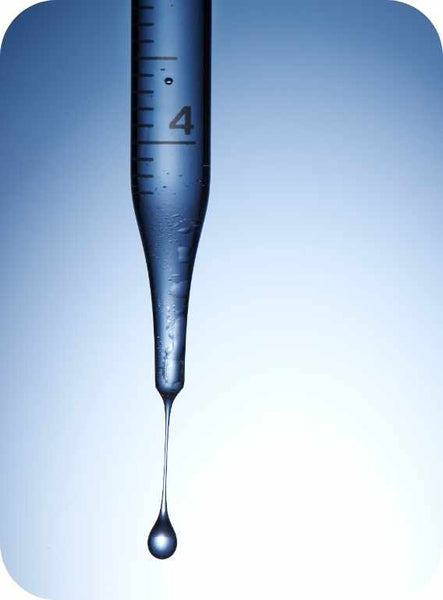

Vitamin D3 K2 drops
What makes our Vitamin D3/K2 drops special
- High-quality compound of vitamin D3 and all-trans vitamin K2 (MK-7)
- One bottle of 20ml vitamin D3/K2 (680 drops) equals a supply for 600+ days (One serving = 1 drop)
- Most of the population suffers from a vitamin D deficiency
You will receive
Part of our loyalty program: You will receive the specified amount as store credit after the purchase.
The MOLEQLAR "Clean Product & Label" philosophy ensures that every product reaches you in top quality. Every single batch undergoes a comprehensive and product-specific purity and residue analysis (heavy metals, microbiology, pesticides).
Shipping
Delivery within 1-4 working days in DE and AT. Orders placed after 12 noon will not be processed until the next working day.
You can find more information on the page for shipping information.
Quality assurance
At MOLEQLAR, we place the highest value on transparency with regard to the quality of our products. Every single product undergoes rigorous testing both by our manufacturer and by independent laboratories in Germany.
Click on this linkto go directly to the certificates.
Recommended intake
Gute Wahl! Dein Artikel wurde erfolgreich in den Warenkorb gelegt!

Vitamin D3 K2 drops
The perfect addition to your shopping cart:
Everything at a glance
Everything at a glance
What is vitamin D3
Function
Application
Ingredients
Certificates
Outstanding quality standards
High availability
A vegetarian nutrient complex for the highest demands. Certified in Germany. For maximum bioavailability, we use vitamin D3 in combination with all-trans K2 in MK-7 form - dissolved in the finest MCT oil
Vitamin D3 K2 from MOLEQLAR

Broccoli as a natural source of vitamin K2

The difference.
Quality, transparency and scientific responsibility are non-negotiable for us.


Independent laboratory analysis
Purity of the ingredients
Transparency for raw materials
Scientific background
Improved bioavailability



Vitamin D3 K2 drops facts

Frequently asked questions (FAQs)
Was sind Risikofaktoren für einen Vitamin D-Mangel?
Vitamin D-Mangel kommt bei ca. 50 % der Weltbevölkerung vor. Es gibt einige Risikofaktoren, die dazu beitragen können, dass Personen einen Vitamin-D-Mangel entwickeln. Dazu gehören:
- Alter: Das Risiko für einen Vitamin-D-Mangel nimmt mit zunehmendem Alter zu, da die Haut im Laufe der Zeit weniger Vitamin D produziert.
- Hautfarbe: Menschen mit dunkler Hautpigmentierung haben ein höheres Risiko für einen Vitamin-D-Mangel, da ihre Haut weniger Vitamin D produziert, wenn sie der Sonne ausgesetzt ist.
- Mangel an Sonnenlicht: Menschen, die wenig Zeit im Freien verbringen oder in Gegenden leben, in denen es wenig Sonnenlicht gibt, haben ein höheres Risiko für einen Vitamin-D-Mangel.
- Wohnort: Nördlich des 42. Breitengrades (Rom und Boston) ist das UV-Spektrum in den Wintermonaten (Oktober bis März) sehr ungünstig. In diesen Monaten kann von Bewohnern der nördlichen Hemisphäre praktisch kein Vitamin D3 gebildet werden, wodurch schwere Mangelzustände auftreten können. Ebenso tragen die zunehmende Urbanisierung und Luftverschmutzung zu einer eingeschränkter Sonnenlichtexposition bei.
- Gewicht: Übergewichtige Menschen haben möglicherweise ein höheres Risiko für einen Vitamin-D-Mangel, da Vitamin D in ihrem Fettgewebe gebunden ist und somit weniger im Blut verfügbar ist.
- Einschränkungen der Nahrungsaufnahme: Menschen, die aufgrund von Krankheit oder Behinderung nicht in der Lage sind, eine ausreichende Menge an Nahrung zu sich zu nehmen, können einen Vitamin-D-Mangel entwickeln.
- Medikamente: Einige Medikamente, wie Kortikosteroide und Antiepileptika, können das Risiko für einen Vitamin-D-Mangel erhöhen.
- Lebensstilfaktoren: Rauchen und übermäßiger Alkoholkonsum können das Risiko für einen Vitamin-D-Mangel erhöhen.
Welche Personen sind von einem Vitamin D-Mangel besonders betroffen?
Anhand der zuvor aufgezählten Risikofaktoren gibt es folgende Personengruppen, die besonders auf ihren Vitamin-D-Spiegel achten sollten:
- Schwangere & Stillende
- Säuglinge, Kinder & Jugendliche
- ältere Personen
- Schichtarbeiter
- Dunkelhäutige
- Raucher
- Personen, die sich verhüllen
Was sind Anzeichen für einen Vitamin D-Mangel?
Ein Vitamin-D-Mangel kann sich auf verschiedene Weise bemerkbar machen. Mögliche Symptome sind:
- Müdigkeit und Erschöpfung
- Muskelschwäche und -schmerzen
- Störungen bei der Knochenbildung, die zu Rachitis bei Kindern oder zu Osteomalazie bei Erwachsenen führen können
- Ein erhöhtes Risiko für Infektionen
- Depressionen
- Eine verringerte Fähigkeit, Schmerzen zu tolerieren
Wenn du bemerkst, dass eines oder mehrere dieser Symptome auf dich zutreffen, sollten du an einen möglichen Vitamin-D-Mangel denken. Es ist wichtig einen Arzt aufzusuchen, um sicherzustellen, dass keine anderen Gesundheitsprobleme vorliegen.
Wie stelle ich eine ausreichende Vitamin D-Versorgung sicher?
Eine ausreichende Vitamin-D-Versorgung lässt sich auf folgende Weise sicherstellen:
- Sonnenexposition: Der beste Weg, um Vitamin D zu produzieren, ist, sich der Sonne auszusetzen. Die Haut produziert Vitamin D, wenn sie der UVB-Strahlung der Sonne ausgesetzt ist.
In unseren Breitengraden herrschen die optimalen Bedingungen zur Vitamin D Bildung zwischen April und September, in der Zeit von 10 bis 15 Uhr. Idealerweise sollte in diesem Zeitraum jeden Tag ein Viertel der Haut (Gesicht, Hände, Teile von Armen und Beinen) ohne Sonnenschutz für 5 bis 25 Minuten (je nach Jahreszeit und Hauttyp) der Sonne ausgesetzt sein. Dabei gilt unbedingt auf den Schutz der Haut zu achten und ein Sonnenbrand zu vermeiden! Einfache Merkregel: Ist der Schatten länger als man selbst, ist keine ausreichende Vitamin-D-Synthese zu gewährleisten! - Nahrungsergänzungsmittel: Vitamin-D-Präparate sind in Form von Kapseln, Tabletten oder Tropfen erhältlich und können eine gute Ergänzung sein, um den Vitamin-D-Spiegel zu erhöhen. Es ist jedoch wichtig, dass die Einnahme von Nahrungsergänzungsmitteln immer mit einem Arzt oder einer Ärztin besprochen wird, um mögliche Überdosierungen zu vermeiden. Menschen, die sich aus unterschiedlichen Gründen bei Sonnenschein nur wenig oder gar nicht im Freien aufhalten bzw. nur mit gänzlich bedecktem Körper in die Sonne gehen, sowie Menschen mit dunkler Hautpigmentierung wird laut den D-A-CH-Ernährungsgesellschaften die Einnahme eines Vitamin-D-Präparats (Supplement) empfohlen.
- Vitamin-D-reiche Lebensmittel: Einige Lebensmittel enthalten natürlicherweise Vitamin D, darunter Fettfische wie Lachs und Hering, Eier, Pilze und Lebertran. Es ist jedoch schwierig, ausreichend Vitamin D aus der Nahrung allein zu beziehen, weshalb die Einnahme von Nahrungsergänzungsmitteln oder eine ausreichende Sonnenexposition empfohlen wird.
Wie sollte ich Vitamin D3/K2 lagern?
Vitamin D3/K2 sollte am besten kühl und trocken gelagert werden. Auch aus direktem Sonnenlicht und von Hitze fern halten. Bitte außerhalb der Reichweite von Kindern aufbewahren.
Wie lange ist mein Einkauf haltbar?
Prinzipiell kann man von einer Haltbarkeit von ungefähr zwei Jahren ausgehen. Diese Angabe dient lediglich als Richtwert, kann demnach variieren und ist ohne Gewähr. Das genaue Mindesthaltbarkeitsdatum deines Einkaufs findest du am Boden der Vitamin D3/K2-Flasche beziehungsweise der Verpackung notiert.












































































